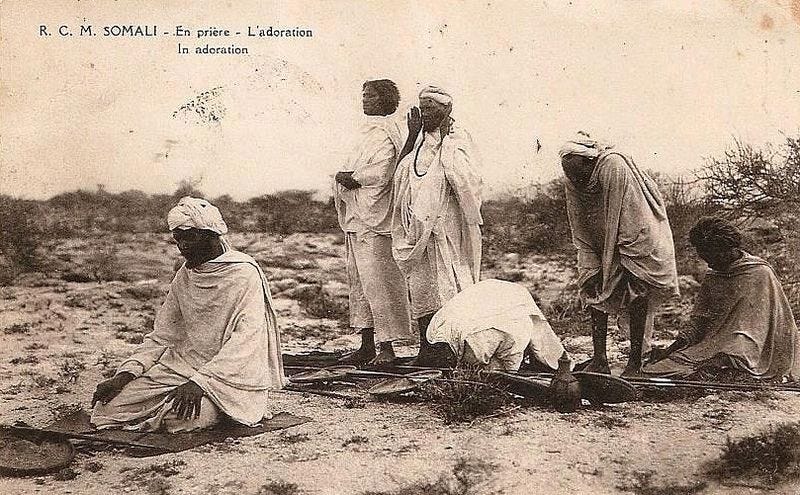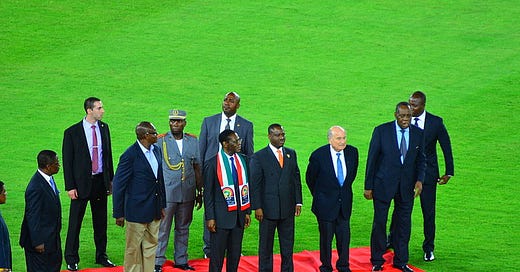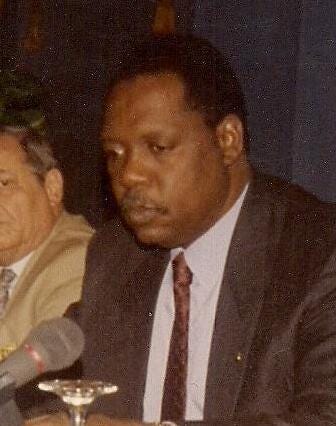Image of the Day

Market Mondays
Year-to-Date Performance:
🟢 Johannesburg SE: 82,824.44 (+7.71%)
🟢 Nigerian SE: 97,100.31 (+29.86%)
🟢 Nairobi SE: 102.47 (+11.25%)
🟢 Ghana SE: 4,440.53 (+41.86%)
🟢 US S&P 500: 5,554.25 (+17.11%)
🔴 Shanghai Composite: 2,879.43 (-2.80%)
🇸🇸 🇲🇺 🇳🇬 🇿🇲 🇿🇼 African central banks are diving left and right to defend their slumping currencies. South Sudan, Mauritius, Nigeria, Zambia, and Zimbabwe have collectively spent at least $1.3 billion since July to prop up their currencies and combat imported inflation.
🇸🇨 🇲🇺 Seychelles and Mauritius: Two tiny island nations making a big splash in the world of African investments. According to Rand Merchant Bank, these Indian Ocean gems outshine the rest of the continent when it comes to economic performance, market accessibility, investment climate, and social and human development. Who needs size when you've got substance?
🇪🇹 Ethiopia, which is opening up its markets, is dishing out billions to help its people cope with the rising cost of living. The country plans to spend $5.5 billion on subsidies for food, fuel, and fertilizer, as well as salary bumps for government workers.
🇳🇦 Namibia, the world's third-largest uranium producer, is not playing around when it comes to mining licenses. With only 68 out of 162 issued licenses actually in use, the government is cracking down on inactive permits.
🇿🇦 The formation of a business-friendly coalition government in South Africa, coupled with Anglo American's plans to spin off a large subsidiary and possibly list another, could be the one-two punch needed to trigger a sustained rally in the nation's stocks.
🇧🇼 Botswana, the world's biggest diamond producer by value, is feeling the pinch of the global economic slowdown. But they're not letting that get in the way of their plans to buy a stake in Belgian gem dealer HB Antwerp. In fact, they're using the downturn to their advantage, aiming to double their shareholding at no extra cost. Meanwhile, the country plans to slash spending on vehicles and travel for public officials to offset a slump in diamond revenues.
🇳🇬 Nigeria's headline inflation rate fell in July for the first time in over a year, bringing a sigh of relief to frustrated Nigerians who have been protesting cost-of-living pressures and governance issues.
🇨🇩 The Democratic Republic of Congo has given the green light for mining activities to resume in the South Kivu province, with one notable exception: gold extraction. The region's governor, Jean-Jacques Purusi Sadiki, had previously suspended all mining activities for unclear reasons.
🇲🇺 Mauritius is facing its driest July in over 100 years, which has affected its sugar production that accounts for 10% of the island’s exports.
🇺🇸 The US S&P 500 hit a six-day winning streak to erase losses from the week before after consumer and unemployment data, which is very likely to lead to an interest rate cut —> probably a weaker dollar.
*Data accurate as of the close of markets across the continent
Spotlight Stories
The Emperor of African Soccer: Issa Hayatou's Reign Comes to an End
Issa Hayatou, the Cameroonian powerhouse who ruled African soccer with a firm grip for nearly three decades, has passed away at the age of 77. As the president of the Confederation of African Football (CAF) from 1988 to 2017, Hayatou transformed the organization from a small-time operation into a global force to be reckoned with, raising its profile and filling its coffers with billions in revenue.
A Jack of All Trades (and Master of Controversy)
Before taking the helm of the CAF, Hayatou was a man of many talents – a standout soccer player, a member of Cameroon's national basketball team, and a national champion in the 400-meter and 800-meter running events. And let's not forget his royal pedigree - his father was a sultan in northern Cameroon.
But Hayatou's reign wasn't without its fair share of controversies. He faced multiple accusations of corruption over the years, although he was never proven guilty of any wrongdoing. Some even accused him of behaving more like a dictator than a benevolent ruler, wielding his power with an iron fist.
Despite the controversies, there's no denying that Hayatou played a pivotal role in raising African soccer’s profile. He fought tooth and nail to bring the World Cup to South Africa in 2010, increased Africa's number of national teams in the tournament, and expanded regional club competitions as well as youth and women's programs.
As an ardent Pan-Africanist, Hayatou wasn't afraid to call out the drain of top talent from Africa to the richer professional clubs of Europe. "After the flight of brains, Africa is confronted with the muscle exodus," he once said, decrying the inequality of the exchange.
Under Hayatou's watch, African clubs made impressive strides at international tournaments. Cameroon's team reached the quarterfinals in the 1990 World Cup, Senegal accomplished the same feat in 2002, and the Nigerian and Cameroonian men's squads took home gold medals in soccer at the 1996 and 2000 Olympics, respectively.
But Hayatou's combative style also led to some controversial decisions, like banning Togo's team from the Africa Cup of Nations after they pulled out of the 2010 tournament following a deadly attack on their team bus. Hayatou remained unrepentant, arguing that the CAF had no army or police force to protect the team.
Love him or hate him, there's no denying that Issa Hayatou left an indelible mark on African soccer. He brought the continent's game to the world stage, fought for its interests, and filled its coffers with billions in revenue. As the saying goes, heavy is the head that wears the crown – and Hayatou wore it for nearly 30 years, weathering controversies and challenges with a steely resolve.
As the tributes pour in following Hayatou's passing, it's clear that his legacy is a complicated one. He was a visionary who helped elevate African soccer to new heights, but he was also a controversial figure who faced accusations of corruption and heavy-handed leadership.
But perhaps that's the nature of being a trailblazer – you're bound to ruffle some feathers along the way. And Hayatou certainly did that, leaving behind a legacy that will be debated and discussed for years to come.
Baobab Recommends…
Photography is a powerful medium for documenting history, culture, and personal experiences.
We encourage anyone interested in African photography or visual culture to check out the newsletter and explore the archive. It is a worthwhile project that deserves support and attention.
The Shady Side of "Saving" African Orphans

So, there's this guy named Jason Carney who's been running around Malawi, one of the poorest countries in the world, claiming to be doing God's work by rescuing orphans and finding them loving American homes.
Sounds like a real feel-good story, right? Well, things are about to get messy.
Carney, a former salesman turned missionary, started a charity called 2nd Milk to provide formula for starving babies in Africa. He also got involved in the lucrative business of intercountry adoptions, brokering deals between desperate American families and supposedly unwanted African children.
But here's where it gets sketchy: Several former employees and families in both Malawi and the U.S. are now coming forward with some seriously troubling accounts of Carney's operations.
Take the case of little Mwayi Siyambili, for example. Carney told an influential pastor in Arkansas that the girl's family wanted to give her up for adoption. The pastor and his wife promptly flew to Malawi and left with Mwayi a few weeks later.
But when a reporter tracked down Mwayi's father, James Siyambili, he said he thought Carney was just helping because his baby was sick and needed food. He didn't even understand what adoption meant and thought his daughter would at least be coming back for visits.
Former 2nd Milk employees say Carney was coaxing families to give up their children and representing to American families that certain babies were available for adoption without proper approval.
The Unraveling Begins
Things started to fall apart for Carney when two American moms, Nellya Canfield and Lauren Farrell, began asking questions and digging into his operations.
Canfield flew to Malawi to meet two babies Carney told her she could adopt, only to find out the girl was no longer at the orphanage and she couldn't visit the boy. Suspicious, she started chatting with former 2nd Milk employees who shared some alarming stories.
Meanwhile, Farrell, a stay-at-home mom with a knack for online sleuthing, started digging into Carney's finances and lifestyle. She discovered he hadn't claimed compensation from his charity for years, but his Instagram showed him living the high life with vacations to the Maldives and a fancy boat.
The two women started flagging their findings to adoption agencies and accreditation bodies, and eventually, the State Department got involved.
Last October, federal agents seized Carney's electronic devices. They suspect he was exaggerating the number of babies 2nd Milk was feeding and using charitable donations to fund his lavish lifestyle.
The adoption agency Carney worked with, Children of All Nations, lost its accreditation in April. 2nd Milk's website has been taken down, and investigations are ongoing.
But the real heartbreak is for the families torn apart by Carney's schemes. Mwayi's grandmother, Margaret Sandram, says she's lost weight wondering if she'll ever see her granddaughter again.
Intercountry adoptions can be a beautiful thing when done ethically and transparently. But stories like this remind us of the importance of due diligence and the devastating consequences when greed and deception are involved.
Food for Thought
“Where there is negotiation, there is hope for agreement.”
— Somali Proverb





